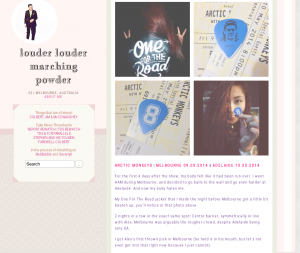I’d never been one to keep a journal for my day-to-days, yet the amount of journals I’ve been given through the years would challenge that, but the elating experience of attending concerts with a few friends and leaving with a dozen more felt like it needed to be documented, and had the potential to be an interesting read.
4 years ago I began a blog on a microblogging and social networking platform called Tumblr to keep track of little details I’d otherwise forget from those shows. Those details then snowballed into essay-length recounts of everything from the lead-up to the concert, right up to whatever I managed to take home with me after the act was long gone.
Since then, I’d been consistently surprised at the amount of like-minded people that contact me on the basis of a single similar interest, and through the years have either upheld continued correspondence or, when possible, have met and become friends. What began as a one-note blog turned into a digital snapshot of my day-to-day, travel diaries, reviews of movies and television, and whatever else I felt I could express well enough in words.
With this experience, I’ve grown to see blogging in a different light, and have become aware of what this relatively new phenomenon can accomplish in the world of networking and social norms.
This week’s reading bundle included ‘Blogs in Media Education‘ by Adrian Miles. It explores the use of blogs in further education as blogs can be utilised to inform and educate. It rings similar to the workings of Bruns’ ‘produser’ theory, where users can both present what they have learnt from the knowledge they’ve consumed, and represent that information to inform themselves and others.
What’s important to note though is the use of ‘network literacy’. Much like a student referencing books and journals they which to associate in their schoolwork, blog authors should also comply with proper associations to source knowledge and ideas to retain legitimacy for both the author as well as readers. In another piece by Adrian Miles, ‘Network Literacy: The New Path To Knowledge‘, he addresses the ingrained literacy we have when it comes to the process of attributing books and journals in our work. With the rise of the Internet being used as a method of acquiring knowledge, the same literacy should be upheld online.
In a previous elective I undertook last semester, we were required to also utilise a blog to submit analysis about Television Cultures and systematic TV tropes. That was the first instance I properly referenced any of my writings that I’d published on the Internet, and unlike previous coursework done purely on Word, the duty of referencing on blog posts felt alien. I’m unsure as to whether that feeling rose because I’d never felt compelled to in my personal writings or just because it’s not something that was ‘ingrained’ in my learning habits.
Throughout this course, I’ll be exploring these issues in the blogging sphere, as well as documenting my own experiences online.
